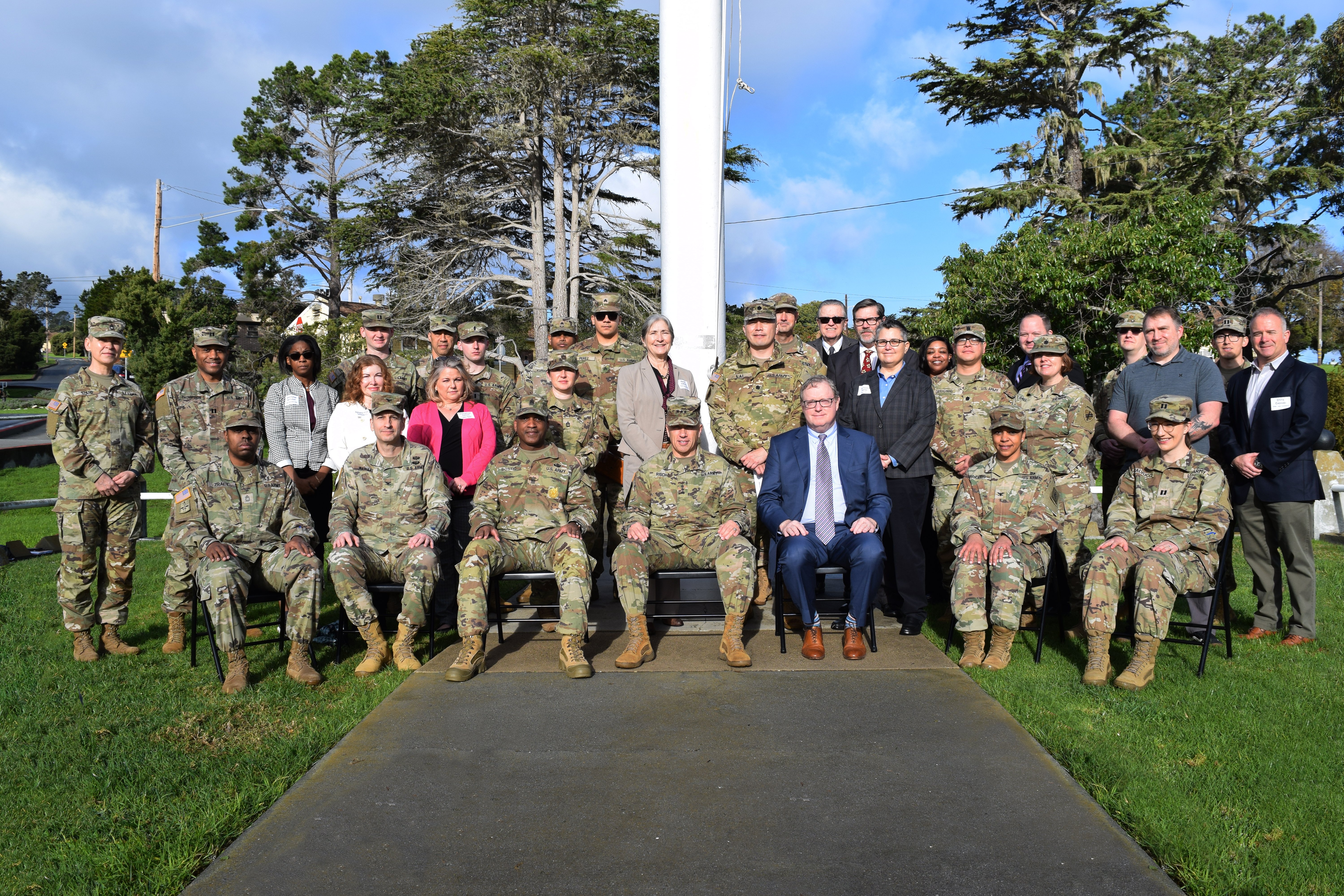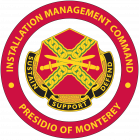About
Mission:
The Office of the Staff Judge Advocate (OSJA) provides DLIFLC; USAG POM; and Service commanders and staffs with accurate, proactive legal advice on all issues impacting DLIFLC’s mission of supporting DoW foreign language requirements worldwide and USAG POM’s mission of providing professional base support services, while delivering quality legal services to Service Members, Retirees, and their Family Members.

Administrative Law
Administrative Law Mission
Provide the command accurate and timely advice on the legal ramifications of any proposed action by interpreting law & regulation. Assist the command in fulfilling objectives by recommending courses of action that are legal and practical. Advocate the command’s position in labor hearings and other forums.
Documents and memorandums:
Army Memorial Authorizations Info Paper
Employee Familiarity with FOIA
Ethical Principles for Changes of Command
Military Whistleblower Protection Act
The Purchase and Presentation of Coins
Tips for Minimizing Litigation Risk
Use of Government-Owned Vehicles
1-SOCO ADVISORY 20-02 - Ethics Reminders During COVID-19
3-GIFT RULES DURING COVID-19 PANDEMIC
Political Activity Information
Political Activity Info Paper (26Mar24)
DA Political Activity Guidance (Video)
Hatch Act Social Media Guidelines
Candidacy in Nominal Nonpartisan Elections
Displaying Photographs of the President During a Reelection
Use of Administrative Leave to Participate in Nonpartisan Poll Activities
Claims & Civil Law
Our Mission
The mission of the Claims & Civil Law Office is to investigate, process, adjudicate, and resolve claims on behalf of and against the United States that originate in 53 of the 58 counties in the State of California and the State of Nevada, including Article 139 claims, tort claims, and affirmative property claims. Additionally, this branch provides legal support for FOIA and Privacy Act actions, the Financial Disclosure Program, Contracting and other civil law matters.
Contact Us
The Claims & Civil Law Office is located in Building 275 at the Presidio of Monterey’s Office of the Staff Judge Advocate. For questions, please call our information line at 242-6396.
Mailing Address
ATTN: Claims, Office of the Staff Judge Advocate
USAG Presidio of Monterey
1336 Plummer Street, Building 275
Monterey, CA 93944-3327.
Tort Claims
Our office receives, investigates, and resolves claims filed against the United States under the Federal Tort Claims Act (28 U.S.C. Sections 2671-2680) and other waivers of sovereign immunity. This includes claims within our AOR by non-service members for ‘slip and falls’, traffic accidents, and other personal injury and property damage where the government is alleged to be negligent.
- Tort Claims (Personal Injury and Property Damage)
- Instructions for Standard Form 95
- Standard Form 95, Claim for Damage, Injury, or Death
Affirmative Property Claims
Our office asserts affirmative property damage claims for damage caused within our AOR. For example, if an individual destroys a stop sign on post, the government will seek the cost of replacing the stop sign.
Affirmative Medical (FMCRA) Claims
Affirmative Federal Medical Care Recovery Act (FMCRA) claims within our AOR are processed by the Madigan Army Medical Center. They can be reached at:
Phone: (253) 968-5175, Fax: (253) 968-2560
Mailing Address: Madigan Army Medical Center, ATTN: MCHJ-JA, 9040 Jackson Avenue, Tacoma, WA 89431.
Article 139 Claims
Personnel Claims
Our office does not process Personnel Claims. All of the Armed Services have consolidated this function into one office per Service. Please find the attachments for their contact information.
These types of claims include: Household goods losses/damages during shipment; POV shipment damage; On-post POV theft and vandalism; On-post quarters damage and theft, and; Unusual occurrences.
Penalties for Filing a False Claim
Pursuant to Section 287 of Title 18, United States Code, anyone filing a false or fraudulent claim may be fined up to $10,000 and/or imprisoned up to five years. Military personnel filing a false claim are subject to courts-martial for violating Article 132 of the Uniform Code of Military Justice.
Criminal Law
Our Mission
Support commanders, and military law enforcement in maintaining good order and discipline by providing expert and responsive advice on all military justice and adverse administrative actions, representing the United States effectively and efficiently in courts-martial and administrative separation hearings, and conducting effective military justice and operational law training.
In addition to military justice, this division also serves as the Special Assistant to the United States Attorney for 7 federal installations to include the Presidio of Monterey, Ord Military Community, Naval Postgraduate School, La Mesa Village, Los Padres National Forest, Clear Creek Recreation Area, Pinnacles National Monument and Fort Hunter Liggett. All civilian related misdemeanors and infractions are processed through the Magistrate Court. If you have any questions about traffic tickets, please call (831) 242-7321.
Contact Us
(831) 242-6385
Room 209A, Bldg. 275
Monday through Friday 0900-1700
Closed on Federal Holidays
Helpful Documents
Manual for Courts Martial (2019)
Counseling and Military Justice (Apr 2022)
Procedural Guide for Article 32(b) Preliminary Hearing Officer
Article 32 Preliminary Hearing TRAINING
Criminal Law Legal Assistance Information
Criminal Defense Military Attorneys: Referral
Driving Under the Influence (DUI) in California
Magistrate Court:
Legal Assistance
LEGAL ASSISTANCE OFFICE
Phone:
Appointments: (831) 242-5084
Location:
Bldg. 358, Buffalo Soldier Trail
Presidio of Monterey, CA 93944
Hours of Operation:
Monday through Friday
8:00 a.m. - 4:00 p.m.
The Legal Assistance Office (LAO) assists active-duty personnel and retirees of all services and their family members with their personal legal affairs.
Services Available:
- Family Law: Advice on Separation, Divorce, Child Custody, and Child Support
- Estate Planning: Wills, Durable Powers of Attorney, Medical Powers of Attorney
- Real & Personal Property Issues: Mortgages, Contract Issues, Consumer Issues
- Landlord-Tenant Disputes: Both On-post and Off-post Housing
- Financial Issues: Debt Collection Disputes, Garnishments, Scams
- Personal Injury/Torts: Consultation On Filing Or Defending Civil Lawsuits
- Taxes: Federal and State Income Tax Questions (Note that we do not file taxes)
- Military Matters: Servicemember Civil Relief Act (SCRA), Security Clearance Issues, Admin Investigations, Admin Separations, Reprimands, Etc.
- Other Legal Issues: Special Education Issues, Immigration, Americans with Disabilities Act Claims, Etc.
- Notaries and Powers of Attorney: Available by Appointment
What We Cannot Do:
No consultation regarding business ventures.
No in court representation.
No advice or representation in civilian or military (UCMJ) criminal cases.
The following documents may be helpful if you have a pending legal issue:
- Know Your Rights - Active Duty Service Members in California
- POM Legal Assistance Guide to Divorce in California
- Financial Fraud Prevention Tip Sheet
- Tenant Rights Moving-In and Moving-Out of a Rental or Military Housing
Servicemembers Civil Relief Act (SCRA) - Use these letters if you need to break your lease early because of change of station or deployment:
- SCRA Commander Letter in Lieu of Orders - Use to Break Lease
- SCRA Servicemember Notification to Landlord
Directions:
The Legal Assistance Office is located in Cottage 358 on Buffalo Soldier Trail off Pvt. Bolio Rd, Presidio of Monterey. Parking is available for clients along Buffalo Soldier Trail.
Call (831) 242-5084 to make Legal Assistance appointments.
Army Legal Assistance Website: https://www.jagcnet.army.mil/legal
Trial Defense
Our Mission
TDS attorneys provide counseling to soldiers facing possible UCMJ or adverse administrative actions. TDS attorneys also provide soldiers with advice and representation (as appropriate) for Article 15's, administrative separations and courts-martial. TDS provides a valuable service to both soldiers and commanders.
TDS Independence
TDS is a "stovepipe" organization. We operate separately from the command and control of the post commander and his attorney, the Staff Judge Advocate. While the TDS attorneys are all Judge Advocates, the organization is separate to maintain independence in representing clients. All the TDS attorneys are under the control of the Senior Defense Counsel.
Common Errors
Soldiers who have incomplete paperwork will not be seen. Common errors are Article 15's that are unsigned and undated by the commander or chapter actions that lack physical or mental evaluations (when required). Another common problem is Article 15's that are forwarded without all the evidence attached. Soldiers are entitled to see all the evidence the command has supporting the alleged offenses on the Article 15. Blotter entries alone are insufficient. For example, if a soldier has been read an Article 15 for DUI, the TDS attorney will need to see the MP statements and the breathalyzer tape (test results) to adequately counsel the soldier. TDS attorneys need to see the first-hand witness statements to adequately advise the soldier, not the second or third-hand accounts sometimes reflected in counseling statements.
These procedures are intended to facilitate the smooth operation of the military justice system. Soldiers and commanders must comply with them.
For further assistance, contact
Joint Base Lewis-McChord, WA TDS Office
(253) 477-1700
DSN 677-1700
Fort Irwin, CA TDS Office
(760) 380-7136
DSN 470-7136




